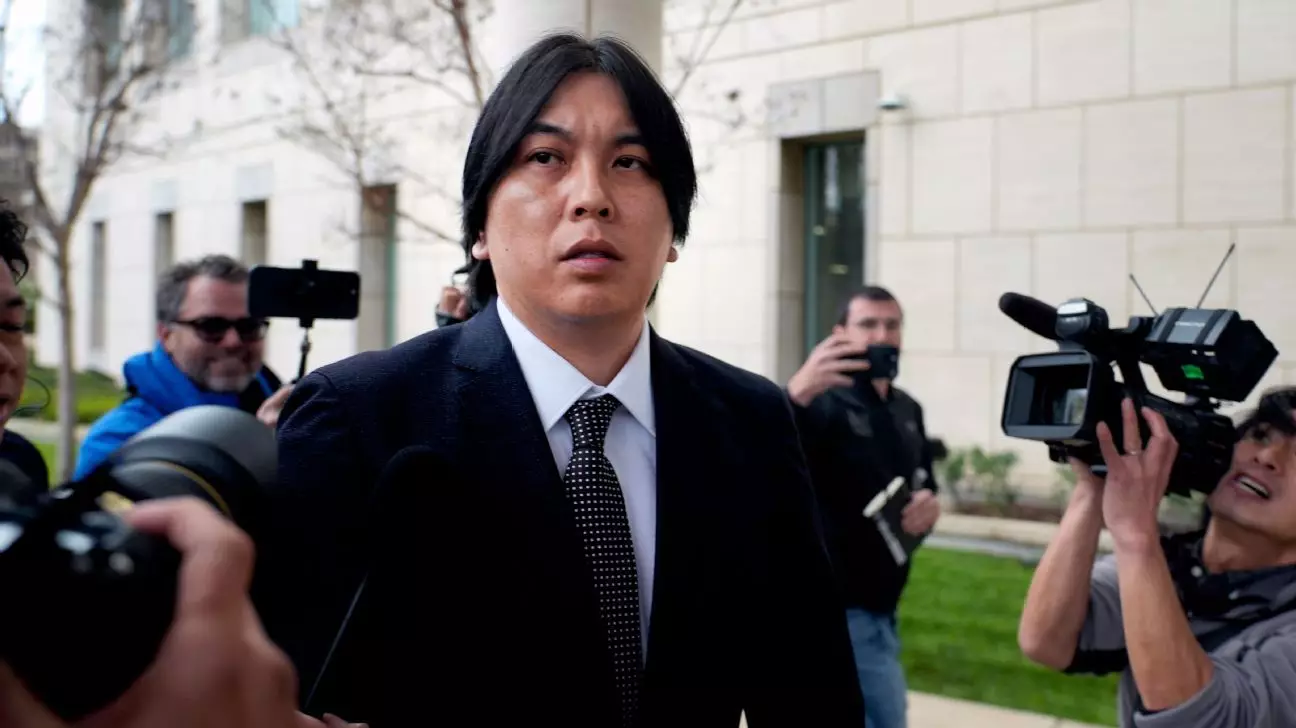In the realm of professional sports, trust is an indispensable currency. When individuals in supportive roles betray that trust, the consequences can be devastating, both personally and financially. The case of Ippei Mizuhara, who swindled $17 million from Los Angeles Dodgers player Shohei Ohtani, serves as a stark reminder of how quickly relationships can deteriorate into betrayal. Mizuhara, once a close confidant to Ohtani, now finds himself facing a severe sentence—57 months in prison followed by supervised release. This case serves not only as a cautionary tale about the perilous intersection of trust, sports, and personal vices but also highlights a systemic issue of oversight in high-stakes environments.
The Dynamics of Trust and Betrayal
Mizuhara’s situation is particularly poignant because he was not merely an employee; he was Ohtani’s interpreter and a trusted ally during Ohtani’s professional transitions in the Major League Baseball (MLB). The unique relationship built on cultural exchange and personal engagement spanned years, a dynamic that Mizuhara cynically exploited to further his gambling addiction. As he siphoned funds intended for Ohtani, he laid bare the fragility of trust in professional sports. The betrayal deeply affected Ohtani, who not only lost a significant sum of money but also endured the emotional weight of having a friend turn adversarial. This breach sends ripples through the MLB community and serves as a crucial lesson about the imperative nature of vetting and oversight, especially concerning financial dealings.
Mizuhara’s downfall raises critical discussions about gambling addiction—an affliction that can distort judgment and lead individuals to make reckless decisions. It is disclosed that Mizuhara placed approximately 19,000 bets with a bookie over two years, accumulating an astounding $40 million in debt. Despite his attorney’s arguments that this addiction was long-standing and exacerbated by the trust bestowed upon him, prosecutors pointed out that there was little evidence to suggest he had exhibited such reckless behavior prior to the theft. The deep-rooted nature of this addiction emphasizes systemic issues within the gambling industry, which often preys on vulnerable individuals without proper safeguards or intervention mechanisms.
The Mizuhara case resonates beyond the courtroom, extending its implications to the baseball community and fans alike. It serves as an alarming reminder of how personal choices can have far-reaching consequences. Mizuhara’s actions not only jeopardized Ohtani’s financial standing but also challenged the integrity of the support systems that athletes rely on. In sports, where faith in one’s teammates and auxiliary staff is paramount, such breaches can lead to an atmosphere of distrust. As Ohtani’s attorney indicated, the saga ultimately casts a shadow over a star player, intertwining his reputation with that of a betrayer whom he once trusted.
Legal Consequences and Future Implications
With a sentence of almost five years in prison, Mizuhara is poised to confront the repercussions of his misdeeds while navigating the complexities of post-incarceration life. U.S. District Judge John W. Holcomb underscored the unprecedented scale of the theft when delivering his verdict, highlighting how the financial ruin inflicted upon Ohtani is hardly something most people will experience in their lifetimes. Furthermore, the court ordered Mizuhara to pay restitution amounting to nearly $17 million to Ohtani and an additional $1.1 million to the IRS, raising serious questions about his ability to repay the sum, whether incarcerated or upon release.
The case’s aftermath includes significant civil, legal, and personal ramifications for Mizuhara, who may ultimately face deportation to Japan. In contemplating this scenario, it is apparent that the judicial system not only serves to punish but also serves as a potential point of reflection for Mizuhara. Whether solace or despair is found in prison walls remains to be seen, but what is indisputable is that this ordeal has illuminated the harsh realities of impaired judgment in high-pressure environments. The fall of Ippei Mizuhara stands as an evocative narrative about the human condition, the frailty of trust, and the unforeseen consequences of addiction, teaching lessons that extend far beyond the confines of one individual’s financial crime.



Leave a Reply